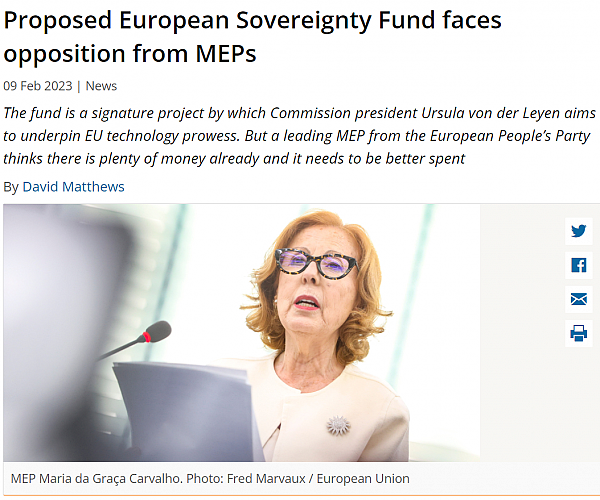Press Proposed European Sovereignty Fund faces opposition from MEPs
The fund is a signature project by which Commission president Ursula von der Leyen aims to underpin EU technology prowess. But a leading MEP from the European People’s Party thinks there is plenty of money already and it needs to be better spent
By David Matthews
A flagship European Commission project to create a European Sovereignty Fund to invest in European R&D and industrial projects is opposed by the Parliament’s biggest voting bloc.
Speaking at the Science|Business annual conference on 7 February, Maria da Graça Carvalho MEP said the European People’s Party (EPP), her grouping of MEPs, is opposed to the plan.
“We don't feel, at least in the EPP, that our priority should be a new fund,” she said. “We have plenty of funds that are not used at the moment.”
For example, there is still lots of money left in the €672.5 billion Recovery and Resilience Facility, an unprecedented wave of grants and loans designed to help the EU recover from the pandemic, Carvalho pointed out.
Many member states have still not used this money, said Carvalho, formerly a science minister in Portugal and deeply involved in European research policy.
Instead of the sovereignty fund, Carvalho said there should be a better focus on putting this money into “research, innovation, competence skills, infrastructures, [and] the necessary infrastructures.”
Commission president Ursula von der Leyen proposed the sovereignty fund in her state of the union address last year and repeated her commitment to it last week as a part of a broader package of measures designed to shield European net-zero industries from the US’s Inflation Reduction Act (IRA).
More details of the proposed fund were set out in a Commission communication published at the same time, explaining how the EU would respond to IRA. Brussels fears the act will tempt European green tech companies over the Atlantic with long-term subsidies for green hydrogen production, for example, and requirements that components for electric vehicles be made in the US.
In the framing of the Commission and von der Leyen, the fund is about making sure Europe does not fall behind technologically – hence retaining “sovereignty”, or freedom from dependence on others, in the technological realm.
The fund aims to preserve a “European edge on critical and emerging technologies relevant to the green and digital transitions,” the Commission’s communication said. But it will also cover areas like microelectronics, quantum computing, artificial intelligence and biotechnology. Earlier this month, von der Leyen said it would be targeted at “boosting resources available for upstream research, for innovation and for strategic industrial projects”.
Conflicting signals
But conflicting signals about the fund’s purpose are emerging from the Commission.
Also speaking at the Science|Business conference, competition commissioner Margrethe Vestager suggested the fund could act more like a venture capital firm, pouring money into EU companies to allow them to scale up as quickly as their US rivals.
“For me, the first most important discussion is what should it be targeted at,” she said. “One of the things that I see that is a differentiation between us and the US, is that we do not have sufficient risk-willing capital for the scale up period of time.”
Most European businesses have to take on bank debts to scale up, she said. “And what you get from debts is worry,” she said. Instead, “what you need is capital and competence.”
If the fund takes the form of an investment vehicle for European start-ups, it is unclear how it would mesh with the €10 billion European Innovation Council, established under Horizon Europe for the same purpose.
Still, Vestager made clear that the shape of the fund remains under discussion. “There are a number of things that are still in flux, where no decisions have been taken yet. Where should the money come from? How should it be used? What should it be targeted [at]?” she said. More details should be available later this year, as the fund is being discussed as part of the mid-term review of the EU’s overall budget.
The Commission communication on the fund last week mentioned Horizon Europe as a potential source of extra money for European green technology ambitions. But there’s no clarity yet on whether the research programme will be raided or repurposed to respond to the IRA.
Vestager also revealed that on 6 February she had spoken to Janet Yellen, the US treasury secretary, to scope out creating a “subsidies dialogue” to understand “what is ongoing on both sides of the Atlantic”, as part of an attempt by EU leaders to soft the IRA’s impact on European industry.
Clique aqui para ler o artigo completo no site da Science | Business.
